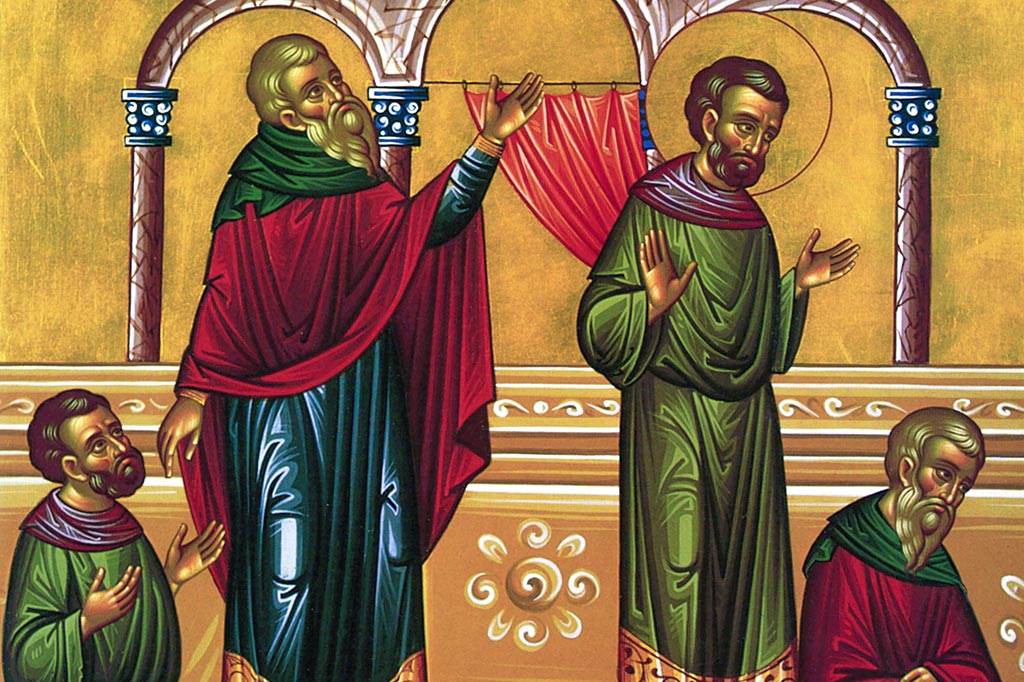For He who sanctifies and those who are sanctified have all one origin. That is why he is not ashamed to call them brethren, saying, “I will proclaim Thy name to my brethren, in the midst of the congregation I will praise Thee.” And again, “I will put My trust in Him.” And again, “Here am I, and the children God has given Me.” Since therefore the children share in flesh and blood, He Himself likewise partook of the same nature, that through death He might destroy him who has the power of death, that is, the devil, and deliver all those who through fear of death were subject to lifelong bondage. For surely it is not with angels that He is concerned but with the descendants of Abraham. Therefore He had to be made like His brethren in every respect, so that He might become a merciful and faithful high priest in the service of God, to make expiation for the sins of the people. For because He Himself has suffered and been tempted, He is able to help those who are tempted.
Hebrews 2: 11-18 (Epistle Lesson on Feast of the Annunciation)
On March 25, we celebrate the Feast of the Annunciation. This event commemorates when the Archangel Gabriel delivered a message to the Virgin Mary that she was to bear in her womb the Son of God. The Gospel lesson, which we will discuss tomorrow, gives the narrative of this account. The Epistle gives the theological background to the Feast.
We know that God created the world and that He created it perfectly. We know that God created human beings and created them perfect. We know that God created human beings so that we could be in communion with Him. And we know that this “communion” with God was severed by the Fall, with man’s choice to sin.
God created us out of love. His love didn’t stop with the Fall. Out of His love for us, He provided a way for us to establish once again the communion we enjoyed with Him before the fall. He would incarnate His only-begotten Son, who would enter the world and share in our human nature. The Incarnation (Christmas) is the feast that commemorates the entrance of the Word of God into the world as a human being, as a baby. Nine months prior to December 25, we commemorate the Annunciation to the Virgin Mary, on March 25.
In his Epistle to the Hebrews, Saint Paul tells us that Jesus “Himself likewise partook of the same nature, that through death He might destroy him who has the power of death, that is the devil, and deliver all those who through fear of death were subject to lifelong bondage.” (Hebrews 2:14-15)
There are two things to comment about here. The first is to compare Christ’s purpose to the workings of an algebra equation. If you write out an algebra equation, 2x + 2=6, then x = 2. We arrive at this simple answer by subtracting two from both sides and then dividing both sides by two. In an algebraic equation, both sides have to balance at all times, what is done on one side must be done on the other in order to keep things in balance. So, when God created human beings, He created us to be like Him. We are not equal to Him, but we are like Him in the sense that we were created to live with Him forever. When the fall happened, there were lots of things that happened on the “human” side of the equation. We got sick, we got tired, we got hungry, we felt sad, lonely, angry, betrayed. And eventually, everyone on the human side of the equation is going to endure a physical death. Look at this equation and you see that man’s side is totally unbalanced with God’s side.
God remedied this by sending His Son into the world to partake of our nature. The Incarnated Christ lived the full human experience. He got tired, hungry, frustrated, lonely, sick, and scared. He was betrayed and suffered physical tortures. At the moment that Christ died on the cross, the equation was once again balanced. Because He partook in our nature, including “dying” as we will all die. After His death, He was resurrected from the dead, ascended into heaven, and sat at the right hand of God. The equation again is unbalanced.
In order to balance the equation, we must live like Christ did, obedient to the Father, overcoming sin and temptation, just as Christ did. We must die in faith, committing ourselves into His hands, as Christ did. Then, by God’s grace, we can be resurrected, ascend to heaven and sit at His right hand, just like Christ did.
The Annunciation is significant because it announced that after the Fall which unbalanced the relationship God intended for us to have with Him, the equation was about to come into balance again through the Incarnation of Christ.
Today is the summary of our salvation, and the revelation of the age-old mystery. For the Son of God becomes the Son of the Virgin, and Gabriel announces the good news of grace. Therefore, let us join him, and cry aloud to the Theotokos: “Rejoice, Maiden full of grace! The Lord is with you.” (Apolytikion, Feast of the Annunciation, Trans. by Fr. Seraphim Dedes)
In Greek, the Feast of the Annunciation is called “Evangelismos” which means “the Good News. The Greek word for Bible is “Evangelion,” which also means “the Good News.” We are very quick to share all kinds of news and gossip. Let us eager share the Good News with others. And that begins by living the Good News ourselves!
